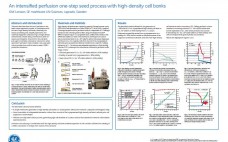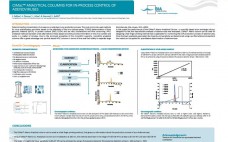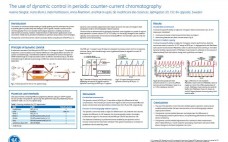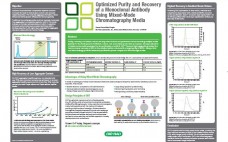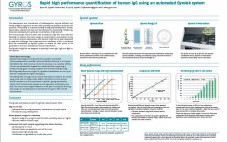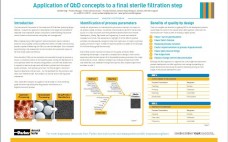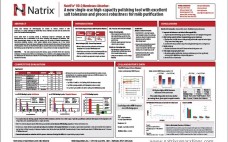This poster will introduce Praesto⢠AC protein A resin and ProcessReady pre-packed columns from Purolite. Platform processes for MAbs manufacturing have long been used to save time and costs. The use of highly productive, cost- effective resins in such platforms can magnify these savings, and the addition of ready-to use formats can further enhance process efficiencies. Our approach is to maximize these efficiencies and cost savings in early clinical-phase production and in the manufacture of biosimilars by using stage-appropriate materials…
2016 Collection
CryoPod⢠Carrier: Standardized Portable Cryogenic Handling of Cellular Therapies
Temperature control during sourcing, manufacturing, and delivery of cell therapies is crucial, as fluctuations can affect viability and function of the cells, and potentially, the overall efficacy and safety of the therapeutic product. In many cell therapy workflows, source cells arrive cryopreserved at LN2 temperatures (-150 to -196 °C) and post-manufacturing, cells are again cryopreserved and stored in vapor- or liquid phase LN2 prior to their use in the clinic. In either case, containers filled with dry ice (-50 to…
Efficient Optimization of CHO Cell Culture Medium and Feed for Increased Antibody Production
Traditional medium optimization strategies are labor intensive, costly, and time consuming. In this project, high-throughput screening technology was adopted along with statistical design to reduce costs and decrease time for optimizing culture conditions for maximized antibody production from a custom Chinese hamster ovary (CHO) cell clone. The presented work includes two phases: phase 1 for basal medium optimization and phase 2 for feed optimization. Phase 1 and phase 2 each have two rounds. A DoE screening methodology was used to…
An Intensified Perfusion One-Step Process with High-Density Cell Banks
Seed culture expansion is commonly performed in several consecutive batch cultures. Starting from a cryopreserved cell stock, the initial culture expansion is typically performed in shake flasks, while the final steps are performed, at greater scales, in bioreactor vessels. Such a procedure is time-consuming and labor intensive with multiple steps that introduce risk for mishandling and contamination. This work describes how the use of perfusion in the seed culture expansion process, in combination with the use of high-density cell banks,…
CIMac⢠Analytical Columns for In-Process Control of Adenoviruses
Determining the concentration of viruses is a crucial step in any production process. The most commonly used methods for virus quantification are either based on the infectivity of the virus (plaque assay, TCID50) determination of their genomic material (qPCR), or protein content (SRID, ELISA) and are very cumbersome and time consuming. HPLC analytical methods represent a fast alternative to these assays since they provide information on the virus content and purity in a matter of minutes. In this work the…
The Use of Dynamic Control in Periodic Counter-Current Chromatography
The interest in continuous bioprocessing to introduce productivity gains and cost savings is rapidly growing. Periodic counter-current chromatography (PCC) is one suitable technological approach, enabling continuous downstream processing. However, implementation in downstream applications is still uncommon mainly due to perceived complexity in operation and process control strategies. This work demonstrates the dynamic control function of ÃKTA⢠pcc 75 chromatography system when applied to a protein A capture step operated in a three-column PCC (3C PCC) setup. Dynamic control enables sample…
Optimized Purity and Recovery of a Monoclonal Antibody Using Mixed-Mode Chromatography Media
Purity, recovery, and elution volume are important factors and parameters when screening multiple media (resins) for the development of efficient, robust, and economical production processes. Among a selection of mixed-mode media evaluated for the purification of MAb S, CHT⢠Ceramic Hydroxyapatite provided the best monomer recovery at 83% in the smallest elution volume with a target purity of 99.5%. Using a bind and elute strategy provided enhanced purification power compared to flow-through modes.
Rapid High Performance Quantification of Human IgG Using an Automated Gyrolab System
The development and manufacture of biotherapeutics requires efficient and timely analytical support to monitor both quantity and quality in products and processes. Productivity is important already during early development. Further downstream, selected cell lines must be optimized for productivity, followed by bioprocess development to yield g/L concentrations of IgG product. The immunoassays that are often used to determine IgG titer must have the flexibility to measure the broad range of concentrations encountered during cell-line and process development, and Gyrolab huIgG…
Application of QbD Concepts to a Final Sterile Filtration Step
The International Committee for Harmonization (ICH) defines quality by design (QbD) as âa systematic approach to development that begins with predefined objectives and emphasizes product and process understanding and process control, based on sound science and quality risk management.â When implementing a QbD approach, biomanufacturers need to identify a productâs critical quality attributes (CQAs) from which a reliable manufacturing process capable of delivering the CQAs can then be developed. This is achieved by performing a risk assessment on each attribute…
NatriFlo® HD-Q Membrane Adsorber: A New Single-Use High-Capacity Polishing Tool with Excellent Salt Tolerance and Process Robustness for MAb Purification
Strong anion exchange (Q) chromatography has become an industry standard in MAb production. It is a proven technology to remove DNA, viruses, endotoxins and acidic host cell proteins from process feed streams in flowthrough mode. Recent trends show an increasing interest in downstream single-use technologies and flexible biomanufacturing due to advancement in cell culture technology and emergence of biosimilars. Traditional chromatography columns are slow, often oversized and not suitable for flexible biomanufacturing. Conventional membrane adsorbers cannot provide sufficient process robustness…




